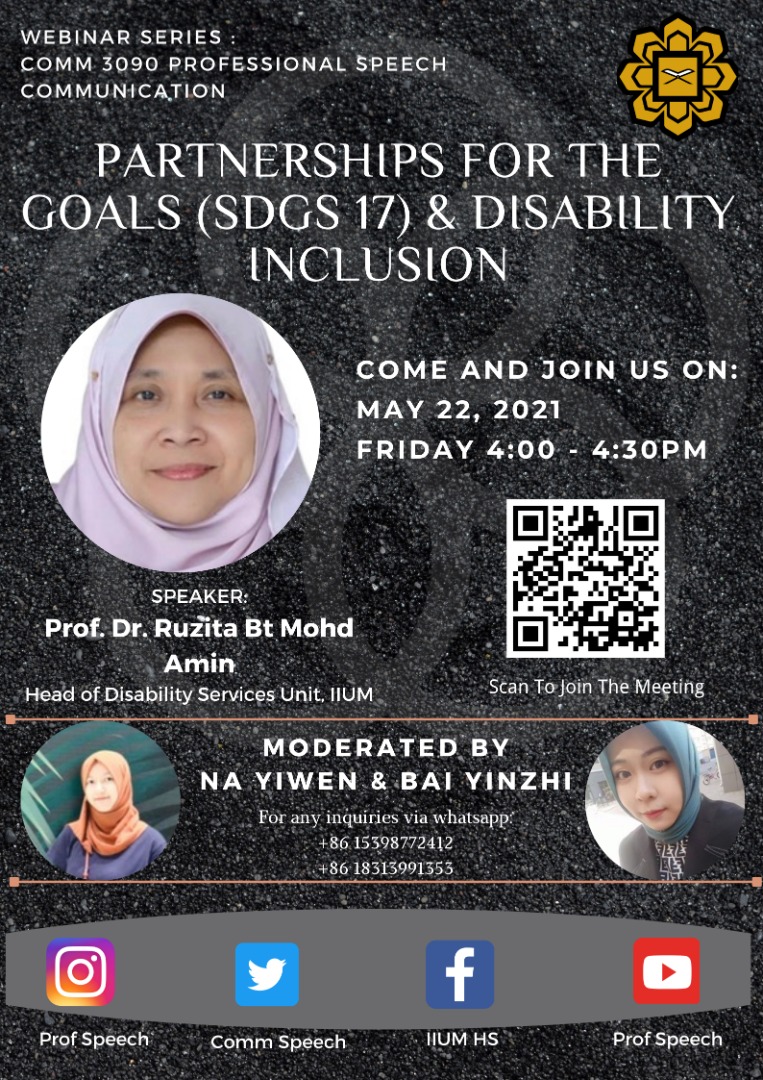By Muhammad Hafizi Hussin and Mohamad Azlan Razali
As persons with disabilities (PwD) have now been identified having various problems, they typically risk being excluded from society. Thanks to increased focus and concern on the PwD shown by organisations through partnership, efforts to promote inclusion and opportunities in this area have been stepped up.
The SDG17 webinar held on 22 May saw a discussion on partnerships for disability inclusion conducted under Professional Speech Communication (COMM 3090) class. The guest for this programme was IIUM’s Head of Disability Services Unit (DSU), Prof. Dr. Ruzita Mohd Amin.
Dr. Ruzita, who is a professor in economic in the Kulliyyah of Economics and Management Sciences (KENMS), told the webinar that she has conducted a lot of research, one of them is about a study on employment opportunities for people with disabilities in Malaysia.
Furthermore, she said that she was involved as a member of the Working Group on Accessibility for Persons with Disabilities under the Engineering Standards Management and Consulting Services Section.
In the webinar session, Dr. Ruzita spoke about things that had motivated her to help the PwD based on her own experiences as someone with disability. She expressed that her disability had motivated her to further explore in terms of what she would like to see in this country and the university, and the realities that they actually face at the moment.
It was not an easy experience for her, her parents and her family to go through. The same goes for all families who have children with disabilities where it is difficult because they cannot do the same thing as normal children. However, despite the hardship, she said, she managed to get good results for her academic performance.
She said that in Malaysia there are a number of categories of disabilities such as physically visible, visually visible, and hearing disability. There are different types of disabilities that also have different needs based on the barriers. Furthermore, people with disabilities have every right to enjoy and participate in all activities just like others, she added.
“This is the reason why and the reality can be seen that there are a lot of room for improvement, and a lot of changes that need to be done and things that we need to work on.”
She also stated that there are about 14 staff and 85 students with all seven categories in IIUM. The DSU made plans to ensure breaking the barriers that were mentioned. They implemented initiatives to break the barriers, so “DSU tried to improve the accessibility of the university to address the immediate issues”.
“They also worked together with the Development Division, all Kulliyyah and the Deputy Dean to provide academic support for the students. They suggested to the Kulliyyah to provide support for people with disabilities.”
“Seven units of Post-Graduate blocks were converted with attached bathrooms to make it easier for use by students with disabilities. Plus, they also have mobility events to help students who have a vent with the hydraulic lift to help transfer them to classes,” Dr. Ruzita said.
Dr. Ruzita remarked that she was a member of the national council for a person with disabilities and the fundings had been given for financial support in conducting programmes along the line of awareness competition and video competition at disability.
She also said that since the DSU was established in 2012, she worked very closely with a lot of partnerships such as government agencies including the Ministry of Human Resources and the Ministry of Higher Education (MOHE) which contributed to the fundings.
œThe contribution from partnerships for every project, however, is usually both monetary and non-monetary,” she added. There are also charitable foundations such as Yayasan FAQEH, Yayasan Prihatin, and Yayasan Warisan Ummah Ikhlas which work collaboratively with DSU, she said.
She further mentioned that NGOs play a pivotal role in launching plenty of events, for instance, the IIUM disability grant awareness campaign. Malaysia Federation of the Deaf (MFD) is one of the NGOs that assists to provide sign language interpreter in many official programmes. Over and above, sign language courses have now been offered in co-curricular courses (COCU) every semester for IIUM students.
œPutting yourself in their shoes, she further defined the meaning of empathy, meaning that œyou try to envision yourself in that persons situation as you envision yourself how a disabled person feels, which you try to imagine how the disabled overall feel, how they experience and so on; as well as you want to create a lot of compassion and humanitarian values among people, and also among students so that students can become volunteers.
The webinar proceeded with a Q & A session where the participants were allowed to ask questions and had further discussions. It was moderated by Na Yiwen and Bai Yinzhi.***
